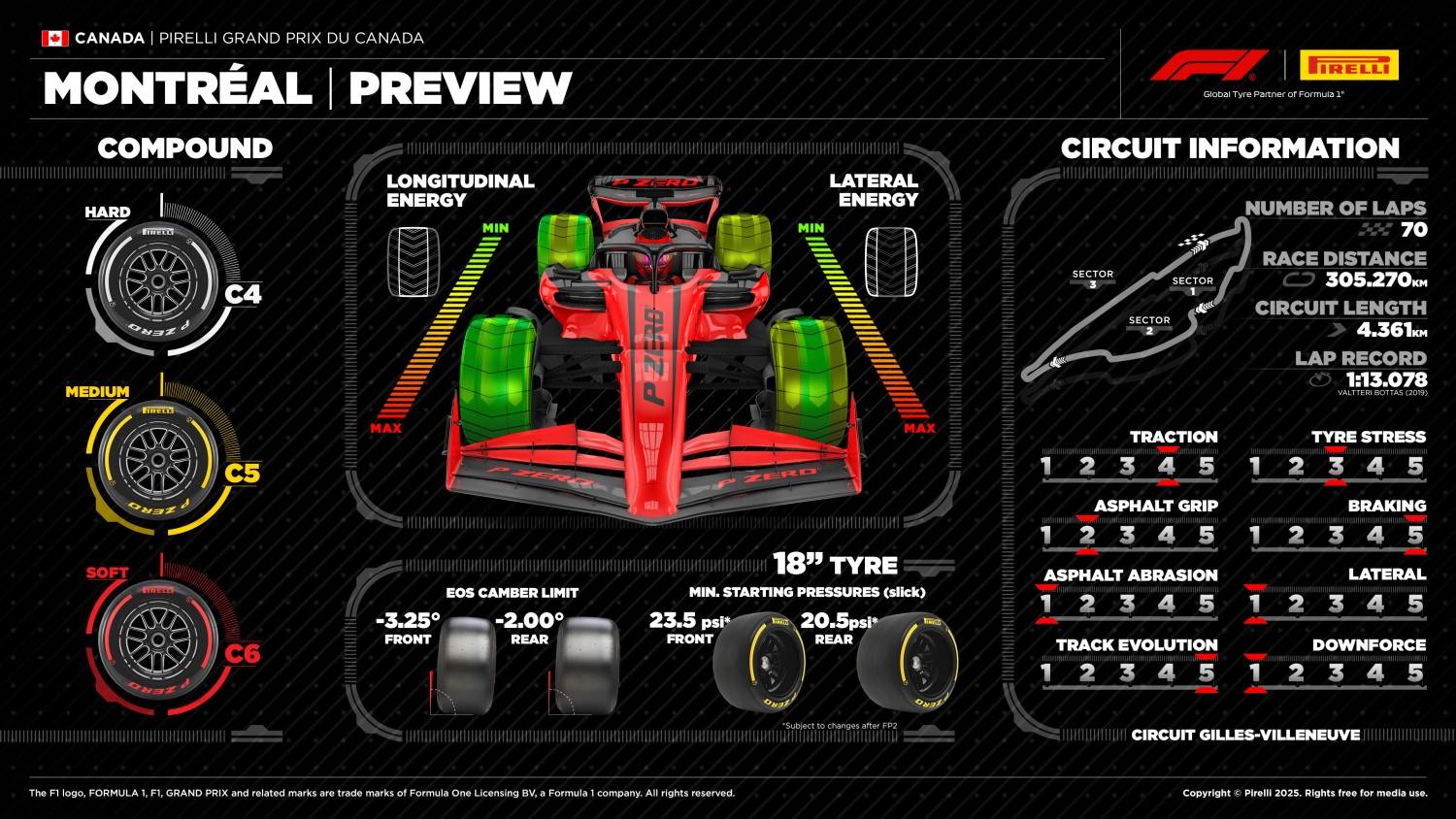Formula 1 News: 2025 Canadian GP in Montreal Preview
The Canadian Grand Prix is the tenth round of the 2025 Formula 1 season, the second in North America after Miami. Montreal is one of the staples on the calendar, for many years the only round in this part of the world.
It is popular with drivers and teams because there’s always a real buzz around the event thanks to the enthusiasm of the local fans. For the whole week, the city in the Province of Quebec comes alive with events linked to the Grand Prix.
The Canadian Grand Prix is on a semi-permanent circuit built on the man-made island of Notre-Dame, originally created for Expo ’67.
The Circuit Gilles Villeneuve is now the fifth-most used circuit in Formula 1 history, and has held the most events of any circuit outside of Europe. The 4.3km circuit features high-speed blasts, medium-speed chicanes, and a couple of hairpins, and it is a deceptively tricky venue. It requires strong curb riding, and for drivers to brush close to the concrete walls, while Montreal’s changeable weather conditions can also impact proceedings.

History
This year’s event will be the 54th Canadian Grand Prix, with the first one dating back to 1967. The race has been held at three venues: prior to Montreal, it has been run at Mosport, around a hundred kilometers from Toronto and at the Mont Tremblant ski resort, 145 kilometers from Montreal.
Canada initially became part of Formula 1’s calendar in 1967, switching between Mosport Park and Mont-Tremblant, before a semi-permanent circuit was formed on the man-made Ile Notre Dame in Montreal’s Saint Lawrence River in 1978.
That inaugural round was won by Canadian icon Gilles Villeneuve, after whom the circuit was named in 1982 following his untimely death. The ‘Salut Gilles’ signature still straddles the track’s start/finish line in his honor. Montreal swiftly established itself as one of Formula 1’s most popular venues, with the vibrant city opening its arms to the championship, and last season it made a successful return after a two-year pandemic-enforced absence.
The Circuit Gilles-Villeneuve looks simple on paper, given its length is just 4.3km and it has only seven complexes of note, but is deceptively challenging. The circuit is characterized by high-speed sections linked by medium-speed chicanes and a couple of heavy braking zones, with strong traction essential out of the slow-speed hairpins. The proximity of the walls adds to the challenge for drivers, none more so than at the final chicane, the exit of which is dubbed the Wall of Champions due to the number of elite competitors who have suffered costly accidents at the complex.
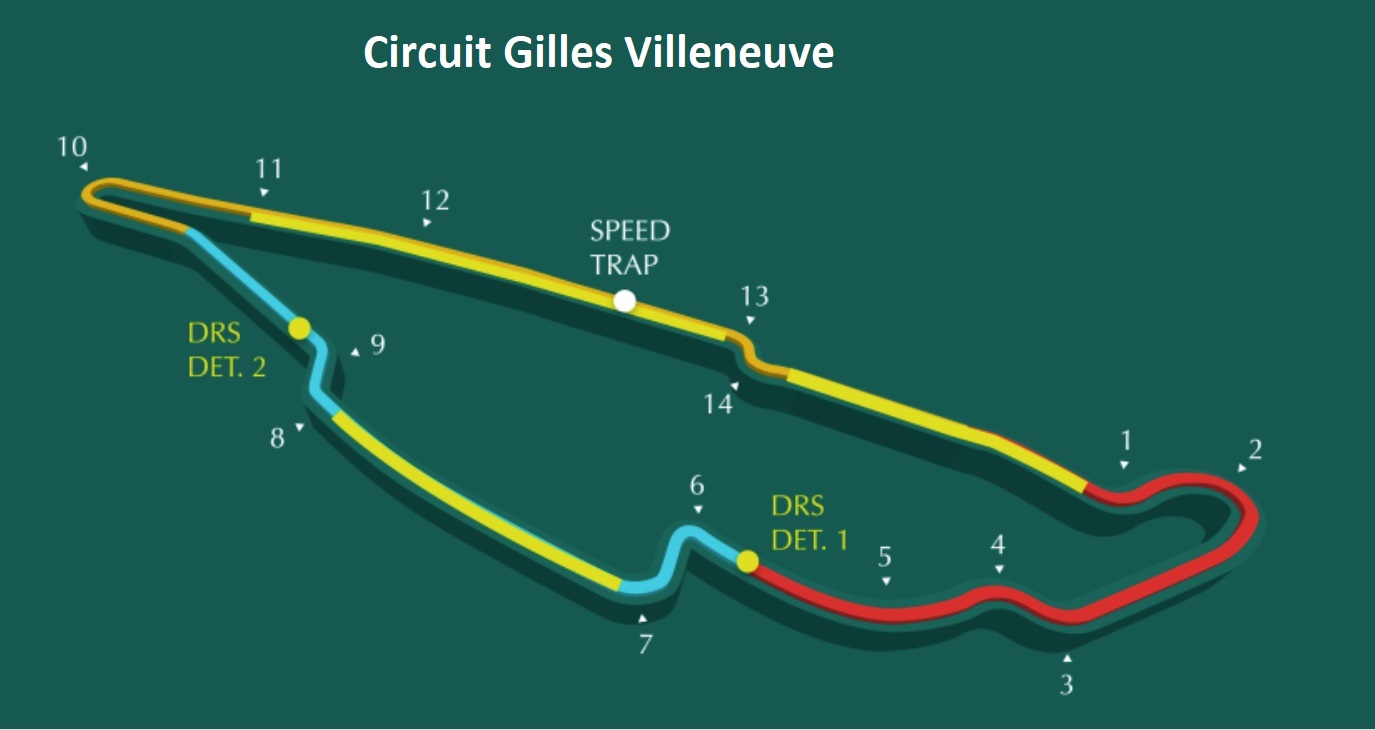
Last Year’s Race
The rain kept everyone on the edge of their seats, and two full safety car periods bunched the field twice, but in the end, Verstappen did what Verstappen does, drove a mistake-free race and won his 60th F1 victory.
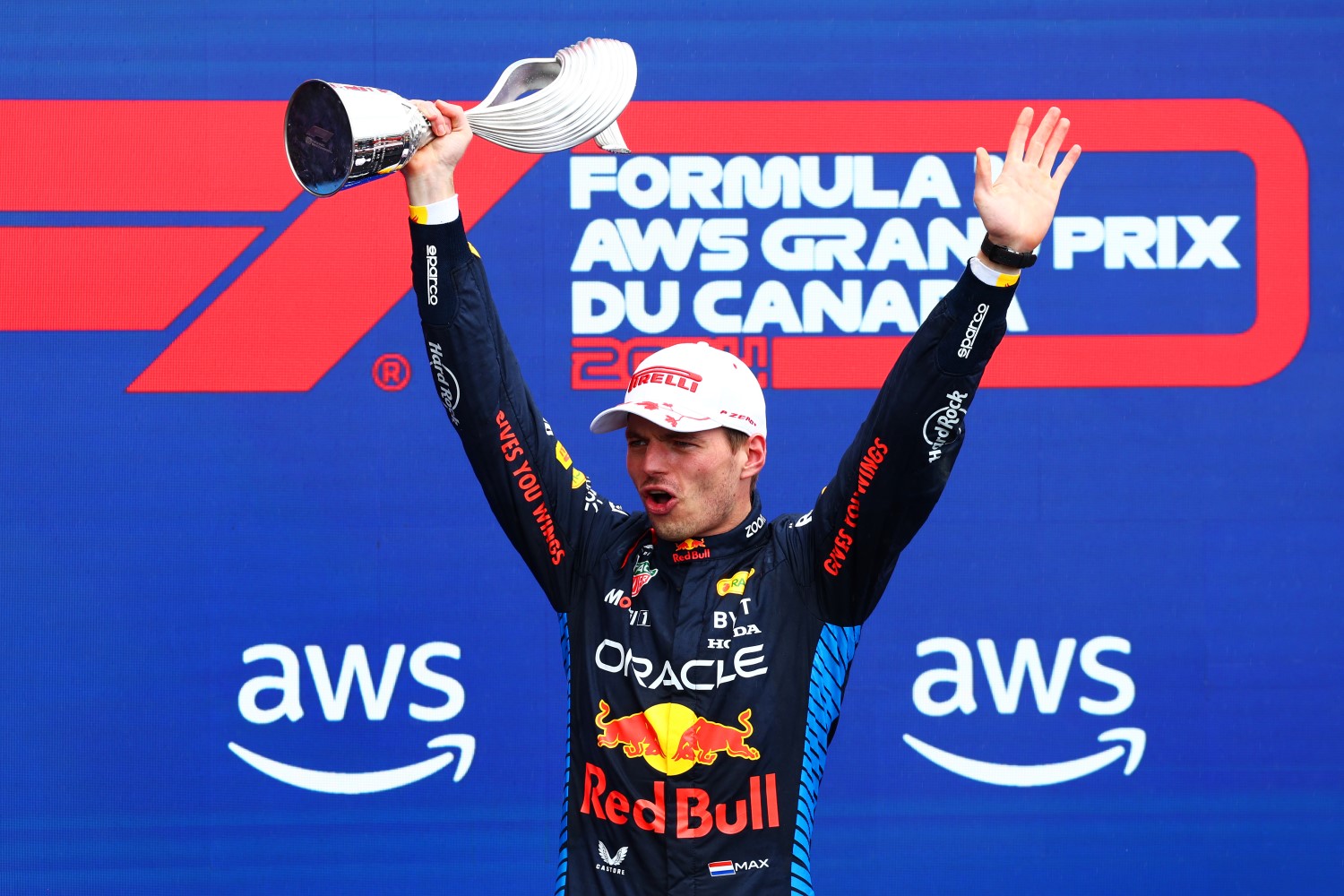
Verstappen started second and ran second early on as he tried to chase down Russell. A mistake let Norris through, but Verstappen soon atoned by picking off Russell to remain second but chasing a different gearbox. Then came a stroke of luck – a Safety Car neutralized Norris’ advantage, with Verstappen pitting for more inters behind it and emerging in the lead. He held onto that lead until pitting for slicks, Norris staying out.
But when the McLaren did pit, Verstappen had enough heat in his slick tires to retake the lead and hold it until the finish to emerge victorious from a chaotic race.
It was Verstappen’s 50th win in the last 75 races and his third straight win in Canada
The race got underway on a wet track. 18 drivers opted to start on Intermediates, while the Haas pair went with extreme wets.
Indeed, Magnussen and Hulkenberg provided the show in the early stages of the race, as the blue banded Pirelli Cinturato offered excellent grip in these conditions, so that both drivers were able to charge up the order, with the Dane even making it as high as fourth place by lap 3, having started 14th.
However, the track was drying out rather quickly and so the American team’s two drivers were the first obliged to pit for Intermediates, as their lap times had slowed considerably.
Then, in the second part of the race, the green-banded Pirelli Cinturato was the tire to have, as conditions alternated between rain and sunshine with the track drying, especially on the racing line, before getting wet again following another shower.
The majority of drivers made the most of the first Safety Car period, forty minutes into the race, to switch to a second set of Intermediates, while a trio made up of Ocon, Tsunoda and Bottas, gambled on their tires lasting long enough to extend the stint until the track was fit for slicks. Sauber’s Finn went to lap 42, while Alpine’s Frenchman and Racing Bulls’ Japanese driver waited a further two laps. These three were the only drivers to complete the seventy lap race with only the one pit stop.
When slicks were viable, the majority (14) of drivers chose the Medium, thus looking for a better warm-up phase, while five went with the Hard, thinking more about wear, armed with the knowledge that in free practice, the Medium had suffered with graining.
2024 Canadian GP Race Results – 70 Laps
| POS | NO | DRIVER | CAR | LAPS | BEHIND | PTS |
| 1 | 1 | Max Verstappen | Oracle Red Bull Racing | 70 | +0.000s | 25 |
| 2 | 4 | Lando Norris | McLaren F1 Team | 70 | +3.879s | 18 |
| 3 | 63 | George Russell | Mercedes AMG Petronas F1 Team | 70 | +4.317s | 15 |
| 4 | 44 | Lewis Hamilton | Mercedes AMG Petronas F1 Team | 70 | +4.915s | 13 |
| 5 | 81 | Oscar Piastri | McLaren F1 Team | 70 | +10.199s | 10 |
| 6 | 14 | Fernando Alonso | Aston Martin Aramco F1 Team | 70 | +17.510s | 8 |
| 7 | 18 | Lance Stroll | Aston Martin Aramco F1 Team | 70 | +23.625s | 6 |
| 8 | 3 | Daniel Ricciardo | Visa Cash App RB F1 Team | 70 | +28.672s | 4 |
| 9 | 10 | Pierre Gasly | BWT Alpine F1 Team | 70 | +30.021s | 2 |
| 10 | 31 | Esteban Ocon | BWT Alpine F1 Team | 70 | +30.313s | 1 |
| 11 | 27 | Nico Hulkenberg | MoneyGram Haas F1 Team | 70 | +30.824s | 0 |
| 12 | 20 | Kevin Magnussen | MoneyGram Haas F1 Team | 70 | +31.253s | 0 |
| 13 | 77 | Valtteri Bottas | Stake F1 Team Kick Sauber | 70 | +40.487s | 0 |
| 14 | 22 | Yuki Tsunoda | Visa Cash App RB F1 Team | 70 | +52.694s | 0 |
| 15 | 24 | Zhou Guanyu | Stake F1 Team Kick Sauber | 69 | +1 lap | 0 |
| NC | 55 | Carlos Sainz | Scuderia Ferrari | 52 | DNF | 0 |
| NC | 23 | Alexander Albon | Williams Racing | 52 | DNF | 0 |
| NC | 11 | Sergio Perez | Oracle Red Bull Racing | 51 | DNF | 0 |
| NC | 16 | Charles Leclerc | Scuderia Ferrari | 40 | DNF | 0 |
| NC | 2 | Logan Sargeant | Williams Racing | 23 | DNF | 0 |
Early Weather Forecast
Friday
Sunshine and clouds mixed. High 68F. Winds light and variable., only a 3% chance of precipitation
Saturday
Partly cloudy skies. High around 70F. Winds light and variable. Only a 3% chance of precipitation
Sunday
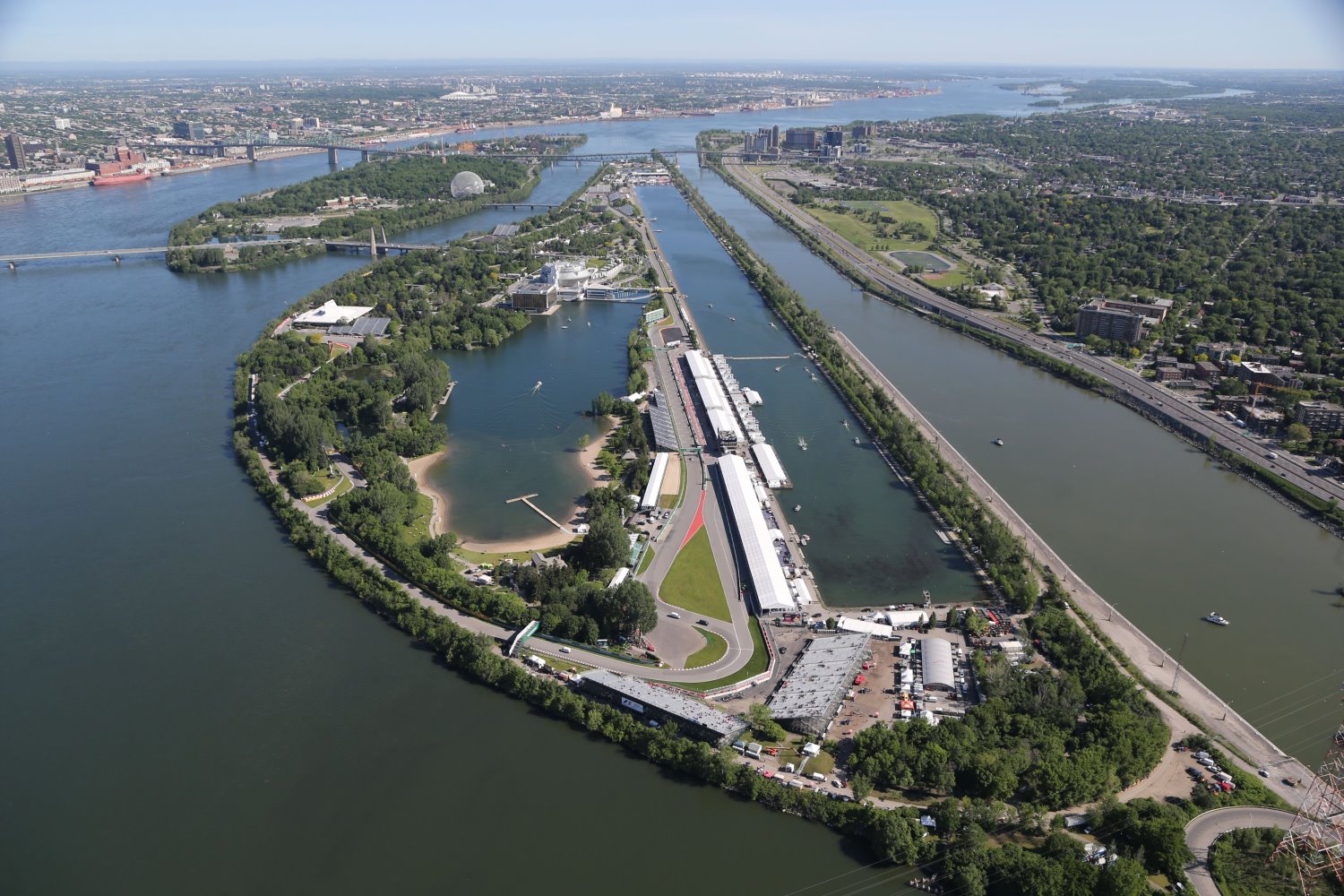
Weekend USA TV
All Times Eastern
| Friday, June 13, 2025 | Location | TV Times | Network |
| Formula 1 Canadian GP Practice 1 | Montreal | 1:25pm – 2:30pm (Live) | ESPN U |
| F1 Canadian GP Welcome to the Weekend | Montreal | 3:00pm – 4:00pm (Live Stream) | ESPN3 |
| Formula 1 Canadian GP Practice 2 | Montreal | 4:55pm – 6:00pm (Live) | ESPN U |
| Saturday, June 14, 2025 | Location | TV Times | Network |
| F1 Academy: Canada Race 1 | Montreal | 9:15am (Live Stream) | ESPN Plus |
| Formula 1 Canadian GP Practice 3 | Montreal | 12:25pm – 1:30pm (Live) | ESPN2 |
| F1 Academy: Canada Race 2 | Montreal | 2:50pm (Live Stream) | ESPN Plus |
| Formula 1 Canadian GP Qualifying | Montreal | 3:55pm – 5:00pm (Live) | ESPN2 |
| F1 Canadian GP Ted’s Qualifying Notebook | Montreal | 6:00pm – 6:30pm (Live Stream) | ESPN3 |
| Sunday, June 15, 2025 | Location | TV Times | Network |
| F1 Academy: Canada Race 1 | Montreal | 10:55am (Live Stream) | ESPN Plus |
| Formula 1 Canadian GP Pre-Race | Montreal | 12:30pm – 2:00pm (Live) | ABC |
| Formula 1 Canadian GP | Montreal | 2:00pm – 4:00pm (Live) | ABC |
| Formula 1 Canadian GP Post-Race | Montreal | 4:00pm – 5:00pm (Live Stream) | ESPN3 |
| F1 Canadian GP Ted’s Race Notebook | Montreal | 5:00pm – 5:30pm (Live Stream) | ESPN3 |
What to Expect
6 Storylines
- Can Max Verstappen overcome the superior McLarens with his Red Bull RB21 sled?
- Will Lance Stroll definitely race in his home GP?
- Max Verstappen on the cusp of a 1-race ban.
- All eyes on Red Bull’s second seat after Verstappen has destroyed all his teammates
- Is the front-wing sage settled? Of course, it is! McLaren Chief Designer Rob Marshall is the best in the business and has made all the other designers look inferior.
- Can race organizers make amends after last year’s disastrous event?
- Heavy rains flooded the paddock and working spaces
- Miscommunication between race organizers, the city, police and Montreal’s transit authority led to issues accessing the track for ticket holders.
- Fans jumped barriers, invading the race track
- Restaurant terraces were shut down in the middle of dinner service by the fire department over by law violations because they were 18 inches too close to main buildings. Fire inspectors are now trained to help businesses find solutions to fire code violations, rather than just pointing them out. Terraces this year are permitted to be five feet larger, allowing more tables and more customers.
- François Dumontier, the longtime head of Octane, the race’s organizer, resigned in August.
- Race Organizer Octane has also consulted other race organizers to learn more about how they run their Grand Prix.
- This year, the experience at the track should be much improved with the implementation of a new app which will help guide and inform fans of entertainment options on site. There are also new color-coded site maps and enhanced food options.
Race interruptions
There hasn’t been a red flag here since the infamous 2011 Canadian Grand Prix, but Safety Cars are common: there have been five since 2014. Since the Virtual Safety Car (VSC) was implemented in 2015, there have been four deployments of the VSC and since then, only 2015 and 2019 have been Safety Car- or VSC-free. The 2023 race had a virtual safety car for an oil leak on Logan Sargeant’s Williams.
Overtaking
It is not possible to overtake here but the short lap and small speed differences mean gaining an advantage over the car ahead can be tricky. There have been 27 passes per race on average over the last three races – ignoring Safety Car restarts, red flag restarts and race starts – and the long straight after Turn 12 is the most popular passing zone.
Strategy
The softest tire compounds are in play this weekend. Normally, this is a one-stop race, but this year’s Canadian Grand Prix could be thrown wide open with the rain.
Unlocking the Lap
The lap begins with a short run to the hard braking zone at Turn One, a left-hander that immediately leads onto the second turn where drivers must hug the inside line for a fast exit onto the following straight. This leads onto the Turn Three-Four chicane, where plenty of curb is taken in an effort to gain time.

Turn Five is a flat-out left-hander that leads into a low-speed corner, Turn Six, where it’s important to set yourself up and accelerate out of Turn Seven and down the straight towards the Turn Eight-Nine chicane. Again, it’s worth taking plenty of curb – just avoid the looming walls on the exit.
Turn 10 is the hairpin, a hard braking zone that demands patience on the throttle before a long DRS straight. Turns 13 and 14 can make or break your lap. The key once again is to use the high Turn 13 curb as much as possible to accelerate out of Turn 14 while avoiding the infamous ‘Wall of Champions’ on the exit of this fiendishly tricky final chicane.
Fact File: Canadian Grand Prix
- The 4.361 km Circuit Gilles Villeneuve is similar in its characteristics to that of the Baku City Circuit in Azerbaijan. Long straights requiring lower drag are punctuated by slower speed corners such as chicanes and hairpins that require higher downforce.
- The track surface ahead of the 2024 Grand Prix has been re-laid.
- The 14 corners of the circuit comprise six left-hand and eight right-hand turns. Most of the corners are in a similar speed range, which is at the lower end of the scale compared to the rest of the circuits on the 2024 calendar.
- This will be the 43rd F1 Grand Prix to take place at the Circuit Gilles Villeneuve. Only Spa, Silverstone, Monaco, and Monza have hosted more.
- Several corners come as a double change of direction (left/right or right/left combinations) that require good responsiveness from the car. These include the combinations that comprise turns one and two, turns three and four, turns six and seven, turns eight and nine, and the final chicane at turns 13 and 14.
- The 405-meter pit lane ranks eighth in terms of length across all the circuits we race at. However, time expended during a pit stop is not especially high, as drivers are spared the inconvenience of going through the last chicane, instead entering the pit lane directly. Additionally, the pit exit feeds in at Turn two, thus drivers avoid having to negotiate the first corner too.
- The Circuit Gilles Villeneuve is traditionally regarded as tough on brakes, similar to the Austrian GP. However, there are usually fewer cooling problems in Canada than in Spielberg because the lap distance is greater and there is more time for the brakes to dissipate temperature.
- The wall on the exit of the final corner has been dubbed ‘The Wall of Champions’ ever since 1999, when Damon Hill, Michael Schumacher, and Jacques Villeneuve all had their races ended at the turn through crashes.
- Along with Miami, Austria and Las Vegas, Montreal has the most heavy braking zones on the F1 calendar with three.
- Lewis Hamilton and Michael Schumacher share the record for the most wins at the Circuit Gilles Villeneuve with seven.
- The circuit is located on the Île Notre-Dame, an island that hosted the World Expo in 1967. The Expo 67 American Pavilion, which became the Montreal Biosphere and is now an environmental museum, is a visible reminder of this.
- The man-made body of water outside the track – which drivers cross over to get into the paddock – was built to host the rowing and canoeing events at the 1976 Summer Olympic Games.
- This weekend will be the 54th Canadian Grand Prix, and 44th in Montreal.
The circuit on the Ile Notre-Dame has 14 corners and is named after late Ferrari great Gilles Villeneuve. McLaren have won 13 times in Canada, Ferrari 12 times (11 in Montreal), with seven poles and nine fastest laps.
The rain-hit Canadian Grand Prix of 2011 was Formula One’s longest race, lasting four hours, four minutes and 39.537 seconds. The safety car was deployed six times, another record.
Aston Martin’s Lance Stroll is the sole Canadian in the race. The last Canadian to stand on a home podium was Jacques Villeneuve in 1996.
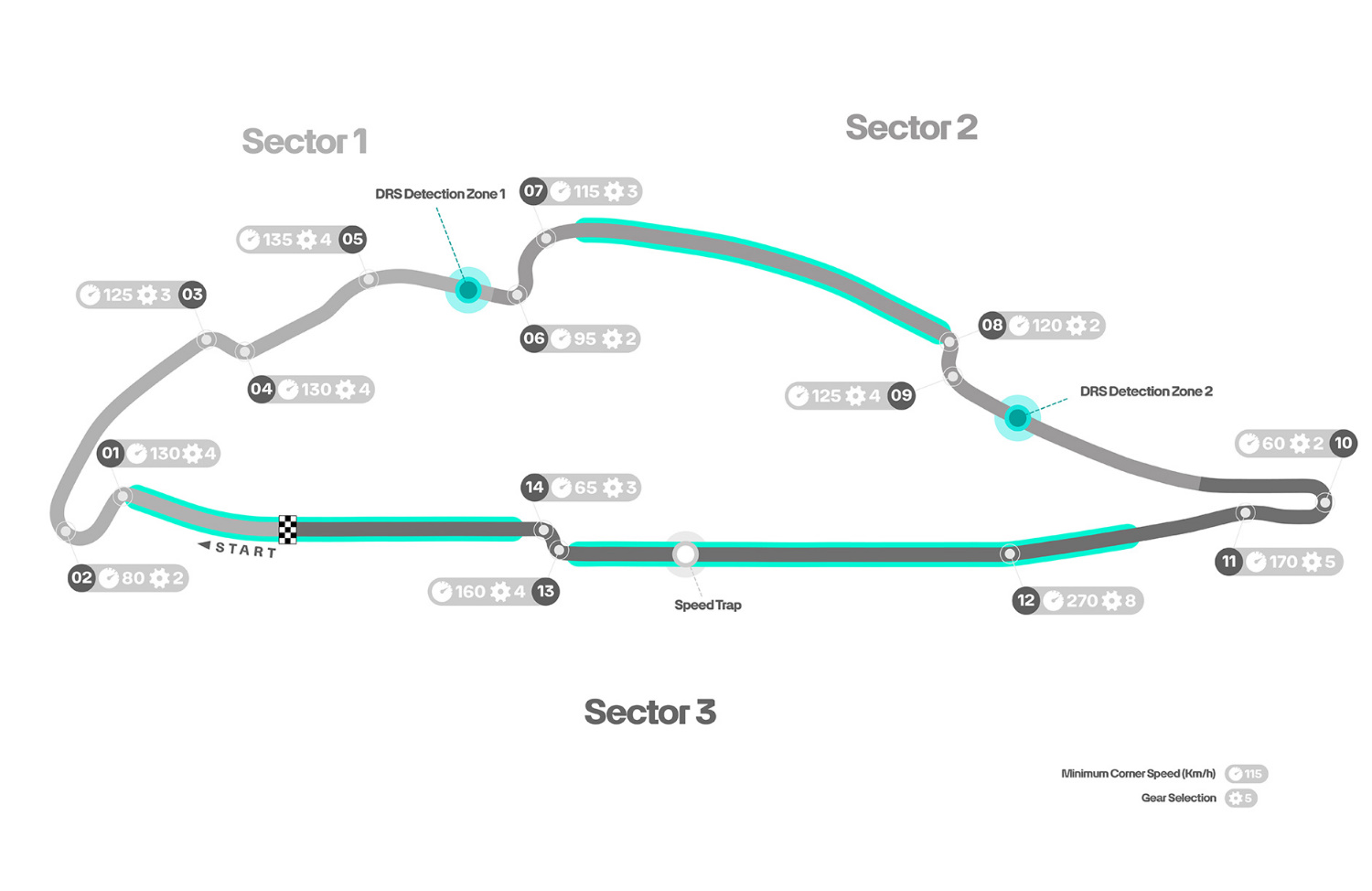
Pirelli Tires
For the third time this season, the softest trio of compounds will feature on track. That means, after appearing for the first time in Imola and again in Monaco, the C6 will be in use, alongside its closest relatives, the C5 as Medium and the C4 as Hard. The selection is therefore one step softer than last year when the chosen compounds were the C3, C4 and C5.
This weekend, when using the new C6, teams and drivers will be able to make the most of the information and data gathered at its two previous appearances. The Gilles Villeneuve Circuit is a track where the lateral forces exerted on the tires are medium to low, while the longitudinal ones are a bit more severe, although not particularly high, because of the cars being subjected to strong deceleration followed by sharp acceleration. The track surface is very smooth and not very abrasive and is never used for racing apart from the Grand Prix weekend. Graining, especially during free practice on Friday, could put in an appearance, but as the track gradually rubbers-in it shouldn’t be a factor. Lap times come down really quickly, not just from one day to the next, but also during each session.
On top of that, the unpredictable and changeable weather is a factor to consider, a wildcard that’s been known to disrupt the on-track action here, while fluctuating temperatures are a feature of the Montreal event.
